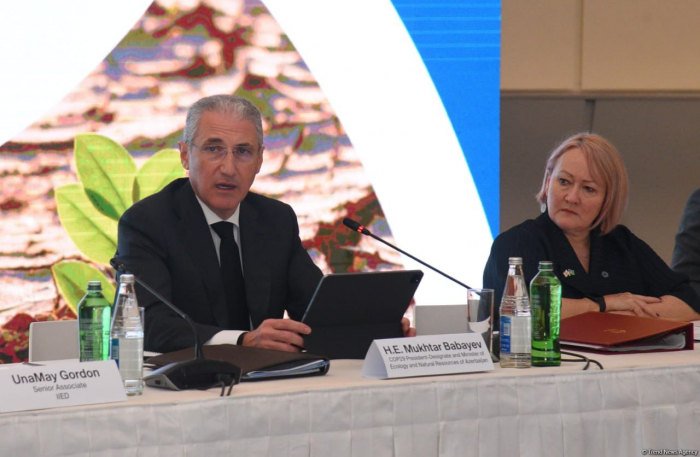The second day of the preliminary meeting of the Conference of the Parties to the United Nations Framework Convention on Climate Change (UNFCCC), known as Pre-COP29, has been held in Baku, AzVision.az reports.
The event, which took place at the Heydar Aliyev Center, was dedicated to the theme “Enhance Ambition and Enable Action”.
This day was packed to the gills with plenary sessions and side events galore.
Minister of Ecology and Natural Resources of Azerbaijan, COP29 President Mukhtar Babayev said that Azerbaijan seeks to attract all sources to climate finance.
The Minister pointed out that the door to financing should be swung wide open.
“We persist in advocating for augmented contributions to the Green Climate Fund; yet, we concur that not all funding can originate from the public sector. Merely two percent of climate change adaptation financing presently originates from the business sector. Multilateral development banks and international financial institutions are crucial in mobilizing private sector investment. We are collaborating with these groups to optimize the scale, efficiency, and accessibility of climate funding,” Babayev added.
Ireland's Minister for Environment, Climate, Communications, and Transport Eamon Ryan noted that Ireland's climate plan is focused on supporting those most vulnerable to climate change.
“We have set an ambitious target for climate finance in 2021 to reach $225 million by 2025, more than double previous levels. One of the key objectives of our climate plan is to better manage finance, as reflected in the Balancing Act. Poverty alleviation and access to infrastructure remain critical priorities even in the face of climate change,” Ryan noted.
He added that Ireland contributes significant funds to several multilateral climate funds, such as the Green Climate Fund, the Adaptation Fund, and the Global Environment Facility. These organizations support countries in building capacity and creating an enabling environment for sustainable finance.
“We realize that the existing mechanisms are sometimes not effective enough, and we need to look for new approaches to accelerate climate action,” the minister concluded.
UK Parliamentary Under-Secretary of State for Climate Kerry McCarthy stressed that it is anticipated that least developed countries and small island developing states will together need between $29 billion and $41 billion annually this decade to adapt to climate change.
"There is a pressing necessity for action regarding the intensifying climate issue; yet, effective finance is crucial, and many individuals requiring substantial intervention are constrained in their capacity to obtain the requisite support," McCarthy explained.
The minister highlighted that least developed countries and small island developing states are at the forefront of the challenges posed by climate change, despite their minimal contribution to its emergence. Nevertheless, they face significant hurdles in securing the necessary funding to innovate solutions and foster sustainable development trajectories.
"The average annual funding for adaptation in least developed nations and small island developing states from 2017 to 2021 was about $7 billion. Undoubtedly, a substantial disparity exists. These data illustrate the difficulties encountered by climate-vulnerable nations in obtaining the requisite funds in adequate amounts," she added.
Vanuatu's Minister for Climate Change John Salong said in a video message that Vanuatu needs more climate finance.
“The sovereignty and territorial integrity of Vanuatu are threatened by humanity's collective failure to divest from planet-killing fossil fuels and failure to mobilize sufficient adaptation funding for those who desperately need it. Our own domestic actions - from budgets to policies to international commitments at the UN International Court of Justice, the International Criminal Court, and elsewhere - demonstrate our unwavering commitment to transformation,” he said.
According to him, small island developing states and least developed countries have unique vulnerabilities and situations that necessitate new and increased collaboration among donors and development partners.
“The gap in climate adaptation funding is serious for us. This gap is existential in Vanuatu as we are facing climate impacts that have cost us over 50 percent of GDP in the last three years,” the Minister noted.
He also added that doubling the financing of adaptation by 2025 is essential.
More about:
















































